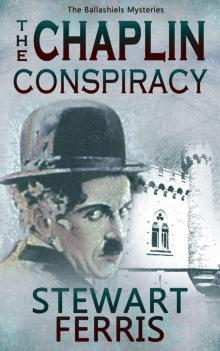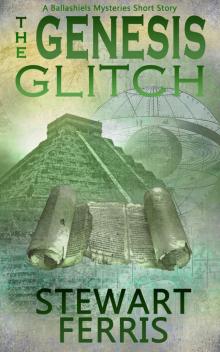- Home
- Stewart Ferris
The Dali Diaries (The Ballashiels Mysteries Book 2) Page 25
The Dali Diaries (The Ballashiels Mysteries Book 2) Read online
Page 25
His companions were scarcely paying attention, their weary eyes distracted by the humbling sight of the two white Ariane rockets that dominated the otherwise verdant landscape. They were already at the outskirts of Kourou and would shortly reach their hotel. It had taken twenty-two hours of travelling to reach this part of South America, including an interminable stopover in Paris during which Ruby managed to achieve a relatively peaceful equilibrium with Lady Ballashiels by ensuring Ratty and the Patient always sat between them.
‘The first method,’ continued the Patient, regardless, ‘is to capture Mitford and restrict his movements until such time as the rocket is launched successfully. But that presupposes that he hasn’t yet made his move. If he has set something in motion already, perhaps by sabotaging a component of the rocket, there is nothing we would be able to do about it.’
‘And what’s the other option for us?’ asked Ruby with a yawn.
‘We give him what he has long appeared to wish for. We end his life.’
‘I’m not spending the rest of my life with the convicts over there on Devil’s Island, thank you very much,’ said Ruby.
‘I fear that if we do not succeed in arresting Mitford’s plans, you will not have a life anyway.’
Everyone stared at the passing scenery for a moment. The taxi continued at a leisurely pace along spacious roads, devoid of heavy traffic or any sense of urgency. Kourou possessed an innocent charm, an understated elegance that was starkly at odds with its status as a spaceport.
‘Children, have you ever considered,’ began Lady Ballashiels, ‘that the people who were denied the chance of life may have made greater contributions to the planet and to mankind than any of our generations were able to do?’
‘That sounds like Mitford’s brainwashing talk, Mater.’
‘What rot, wiffle and waffle. It’d take more than his scrubbing ability to wash my brain, boy.’
‘But presumably it was one of his arguments, Mater? And it does make you wonder, doesn’t it?’
‘The question is one of moral choice,’ said the Patient. ‘Where is the balance of morality? If you are presented with the opportunity retrospectively to undo the turmoil and killings of the Second World War, and to permit all of those millions who were killed the opportunity to live out their natural lives and to procreate, then you have to balance that good against the cost of erasing the lives of many more millions who have filled their shoes. What is more valuable: actual life or potential life? If you value potential life so highly, then it surely follows that it is a crime not to utilise a woman’s every egg cycle for pregnancy, for each period is a potential human life lost. When you take the argument to that extreme it becomes ludicrous.’
‘The problem with Mitford is not one of morality or finding the balance of good and evil,’ said Ruby. ‘The issue with him is that it’s personal. He represents one of the lives given a chance that shouldn’t have occurred, but his life came from Hitler and Unity Mitford, and that’s always been too much for him to bear. It’s driven him insane. And that’s going to make him a tricky man to catch.’
The taxi arrived at the hotel forecourt and stopped.
‘Tricky to catch?’ asked Ratty, climbing out of the taxi. ‘Perhaps. But I’d say perhaps not. Isn’t that the frightful fellow in the lobby?’
Lady Ballashiels looked unsteady as she stood in front of the hotel, watching the man who had ruined her life in retaliation for the fact that her motherin-law had ruined his by not preventing the circumstances that led to his birth.
‘I’ll have a word with him,’ said Ratty.
‘A word? Ratty, we have to corner him,’ ordered Ruby. ‘Get him to come outside, or into a corridor or something. Just get him away from public view so you and the Patient can tie him up. And when you’ve done that, Ratty, put some proper clothes on. You look ridiculous in that lumpy jacket.’
‘If I may make a suggestion,’ said the Patient, ‘a more subtle approach is far more likely to achieve our desired result. Ratty, I propose that you buy the man a drink. Keep him drinking. Keep him talking. Find out if he has already done whatever he was planning to do. Give me time to buy the drugs I need. We’ll spike his drink and secure him in a hotel room when he is unconscious.’
‘Mister Patient, that will never work,’ said Lady Ballashiels. ‘The man is teetotal. He now eschews all forms of drugs because they mask pain, and he feels it is his duty to experience all of the pain that the world puts his way.’
‘How’s a fellow to knock a chap out in a hotel without drink or drugs?’ asked Ratty.
Mitford started walking towards the door. He was accompanied by a man they didn’t recognise. Mitford and English climbed into the same taxi that Ratty and his entourage had just vacated. From behind various parked cars they watched Mitford and the mystery man being driven away. Ratty hailed the next taxi and they all squeezed into it and set off on a snail’s pace pursuit that ended at the fishing dock.
‘We could have walked here at that speed,’ said Ruby. ‘Could have saved the cab fare.’
They watched from a distance as Mitford and the younger man walked to the end of the dock and started to appear agitated. They argued and gesticulated. Fists started to pummel each other. Mitford took a step back and pulled a gun. With no warning, he shot the other man and let him fall backwards into the river, his body immediately starting the short journey out to sea.
‘Did that really just happen?’ asked Ruby.
‘Shame it wasn’t vice versa,’ said Ratty. ‘Could have saved us a bit of bother.’
‘Be careful, children. He’s not normally in the habit of shooting people. His mental state is obviously deteriorating. Always assume he will shoot. Don’t take any chances.’
Mitford stomped back along the wooden jetty, past the heaps of fishing nets, to the shore.
Ratty crouched behind a fishing boat and shouted, ‘I say, would you care to join us for tiffin, old beanbag?’
Mitford looked around for the source of the voice, but could see no one. His shoulders sagged. He held his gun loosely against his thigh, as if about to drop it.
‘It might have a somewhat French flavour, of course. Proper cream teas are something of a rarity in these parts.’
Ratty stood up and waved at Mitford. To the horror of all those watching from secure vantage points, Mitford raised his gun again.
‘That’s not exactly cricket, old boy, is it?’ said Ratty, walking boldly towards him. ‘Why don’t you put that frightful thing away before someone gets hurt?’
‘You have had plenty of warnings, Lord Ballashiels,’ said Mitford with a deep sigh.
He straightened his arm and fired at Ratty’s chest. The aristocrat fell backwards onto the decking. Mitford broke into a run, but he lacked the energy and the determination to give himself a real chance of escape. The shootings seemed to affect him deeply. Remorse yanked him back to the scene of his crimes and he stopped and crouched into an almost foetal position.
‘You are a pathetic and despicable man,’ shouted Lady Ballashiels, not caring for her own safety as she rushed to her son’s side. She picked up Ratty’s head and cradled him. ‘Ruby, girl, call an ambulance! I’m so sorry, Justin. This is all my fault. You’re going to be fine, I promise.’ She patently lacked conviction in her words.
Mitford just watched, unable to cope with the rapidly evolving reality in which he found himself. His gun-toting hand twitched, as if controlled by an entity beyond his own mind.
Ruby dialled for help, consciously hoping that Lady Ballashiels would notice her fluent French when the call was answered, but there was no signal on her phone. She ran in circles trying to find a patch of reception, stopping frequently to check the screen, and finding herself in an increasingly distressed state.
The Patient checked Ratty’s pulse, looked at his pupils, and listened to his chest. Without a word, he then strolled over to the stricken Mitford, curious as to his mental state. Mitford was flicking the gun back and forth, bu
t there was no real direction to it, no deliberate aiming. The Patient reached out and put his hands over the weapon. Mitford offered no resistance, nor even any awareness of what was happening. His breakdown appeared total, the Patient thought. He plucked the weapon from the old man’s hand and pocketed it. He considered restraining Mitford, but such a course of action appeared unnecessary.
‘Justin, can you open your eyes?’ whispered his mother. ‘We’re trying to get an ambulance, boy. Can you hear me at all?’
Ruby rushed over to him and held his hand.
‘Ratty? Are you still with us? Hang in there. It’s going to be all right.’
‘I do wish you’d stop calling him by that repugnant name, girl.’
‘Lady Ballashiels?’ Ruby asked confidently.
‘Yes, girl?’
‘Shut your snobby cakehole and give your adorable son a kiss.’
Lady Ballashiels noticed a tear forming in Ruby’s eye. She could sense the strong bond that this woman shared with her son.
‘Are you two more than just good friends?’ the old lady whispered. ‘Perhaps a kiss from you might help bring him round?’
‘Us? Not really, Lady Ballashiels. We’ve been friends since university, that’s all. Nothing more.’ But she couldn’t stop herself from leaning forward and kissing Ratty on the lips.
He smiled and opened his eyes. ‘Well that little lie down seems to have done the trick,’ he groaned. ‘Mitford took the wind out of my sails somewhat, but I think I’ll be right as rain.’
‘Don’t talk, boy,’ said Lady Ballashiels. ‘Wait for the doctors.’
Ratty wriggled out of her arms and sat up.
‘Doctors? No, thank you. A gin and tonic might go down well, though.’ He put his hand inside his shirt and unzipped one of the many pockets on the utility jacket he was wearing beneath everything. He pulled out a stubby, square paperback on the subject of Salvador Dalí’s works. Just off-centre was a neat hole from which a steaming bullet was protruding. ‘Dalí has always been close to my heart,’ he said.
The Patient, distracted by Ratty’s apparent miracle recovery and by the unfamiliar sensation of holding a gun in his hands, took his eye off Mitford just as the old man seemed to come to his senses.
‘You don’t matter. Don’t you see? Nothing matters. Alive or dead, it makes no difference!’ Mitford shouted as he ran towards the trees. ‘My agony is almost at an end. I will not allow any of you to prolong it unduly. My one contribution to the planet will be my own erasure. Oh, how I hate the Ballashiels family. You are a plague on this earth. You are a curse on mankind. Stay away from me or face the consequences.’
He disappeared into the trees.
***
Half a mile upriver was a second boat dock. This was more substantial than the first, a concrete structure designed to receive the barges that carried sections of rocket by sea to the space centre. Charlie looked back. Thanks to a bend in the river, the point at which they had stolen the seaplane was now out of sight.
‘How do we park this thing?’ shouted Charlie over the noise of the outboard motor. The towed seaplane was still ploughing through the water behind them.
‘We just stop by the dock,’ Rocco replied.
‘Just stop?’
‘Sure. We put our motor in reverse and we stop.’
‘And what stops the seaplane?’
Rocco looked at him. He slowed his boat gradually. The aircraft continued towards them on its floats, the tow rope now submerged and useless.
‘Forward! Quick!’ shouted Charlie, ducking as the shadow of the plane loomed over him.
Rocco pushed the engine to full power. Their boat sped forwards. Charlie looked over his shoulder to see the rope snap out of the water. A sharp cracking noise distracted him. One of the cleats to which the tow rope had been tied had sheered clean off, taking part of the wooden hull with it.
‘Er, Rocco, my feet are wet,’ complained Charlie.
‘Shit. Hull’s breached,’ said Rocco, throwing the engine into reverse.
‘No, don’t stop!’ shouted Charlie. ‘The plane’s right behind us!’
‘Hang on,’ said Rocco. He turned the boat a hundred and eighty degrees, tilting it so far to one side that it scooped up a few more gallons of water, and pulled up adjacent to the seaplane. ‘Climb onto the floats.’
With the two of them clinging to the port side float, and the stolen fishing boat now fully submerged, the seaplane began to swing in an ungainly arc across the river, spinning out of control with the breeze. The dock reached out halfway across the river ahead of them. Collision was inevitable.
‘Think I’ve worked out how to stop the plane!’ shouted Rocco. ‘Hold tight!’
The tail of the seaplane wedged itself above the dock, while the fuselage scraped against the concrete wall and pushed the nose down into the water. The aircraft halted to the sound of stressed aluminium pulsating with the force of the water. The two passengers climbed onto the dock and whooped their expressions of satisfaction.
In a locker on another fishing boat Rocco found some tools and held up a selection of them to show Charlie.
‘What do you think is best for getting that door open?’ he called. ‘Screwdriver, spanner or pliers?’
While Rocco was contemplating the options, Charlie put his foot through the cockpit window. Perspex shards exploded all around him. He put his sleeve over his hand and cleared enough fragments away to be able to reach inside and open the door. Behind the pilot’s seat was a sheet. He lifted it up and was relieved to find the Westinghouse time capsule beneath it.
‘Come and help me carry this thing,’ he shouted.
‘Quickly,’ said Rocco. ‘Pass it out before the plane gets dislodged by the current.’
Charlie squeezed into the rear of the plane and fed the heavy capsule through the pilot’s door to Rocco. Once he had a secure grip on the ring at the end of the tube, Charlie joined him on the dock and together they dragged the capsule out of the tilted seaplane and onto dry land.
‘Now what?’ asked Charlie.
‘Get it into one of those huts so we can open this thing up,’ said Rocco. ‘If we can saw one end off, everything inside it should tip out.’
Charlie ran around the boatyard opening doors, looking for something resembling a workshop, relieved that the place seemed to be deserted. In a country of less than a quarter of a million people, it seemed fitting that parts of it would appear empty. When he found a suitably equipped shed he ran back and helped to carry the capsule inside.
‘Close the door,’ said Rocco. ‘Surgery is about to begin.’
‘What if Dalí put poison gas in there?’ asked Charlie.
‘Keeping the door open won’t make a lot of difference if he did,’ said Rocco. ‘Anyway, I don’t think that was really Dalí’s style. He never hurt anyone.’
Rocco began to saw through the copper alloy, following a shallow groove that had been created for that purpose and was clearly marked with the words ‘cut here’. Despite the implication that there was nothing of value behind the cut line, he rotated the capsule to avoid cutting in too deeply. When the inner seal was pierced, there was a release of gases that made Charlie scramble for the door with his sleeve over his face.
‘It’s nitrogen,’ Rocco explained. ‘They filled it with the stuff to stop anything decaying.’
It took ten minutes to decapitate the capsule. Rocco pulled the head off gently and tried to look inside. Everything was tightly packed, with glass wool filling the few spaces that remained.
‘How do we know what was meant to be there and what was there anyway?’ asked Rocco.
‘The old man gave me a book,’ said Charlie. ‘It lists everything that was officially included in the capsule. Anything else is Dalí’s.’
‘Great,’ said Rocco. ‘Where’s the book?’
‘In my hotel room. New York.’
‘This could be a waste of time if we don’t know what we’re looking for,’ said Rocco.
<
br /> ‘Google,’ said Charlie. ‘Find it there. Someone must have scanned it and uploaded it as an eBook by now.’
Charlie took out his cellphone in the hope that perhaps a university library copy had been digitised. But no matter how high he held his phone there was no signal available.
‘Let me try,’ said Rocco. He pulled out his own phone with equal lack of success. ‘What a heap of junk! This is a spaceport and I can’t even use a cellphone!’
‘Just shake it all out on the table and look for anything that seems to be Dalí’s,’ said Charlie.
‘I guess we have no choice,’ agreed Rocco.
Charlie tilted the capsule while Rocco dragged the contents out. Nothing slid easily; everything was jammed in tightly. Soon the remaining items were beyond the reach of his arm.
‘Go find a stick or a broom handle, Charlie,’ he said. ‘Anything I can use to drag these things out. Needs to be six feet long.’
Charlie stepped out of the shed and scouted around the outbuildings and boats. While he was peering into the window of a hut he felt a hand upon his shoulder.
‘You did well at Flushing Meadows,’ said Mitford.
‘How did you find me here?’ gasped Charlie, shocked to see the scary face of the old man here on the other side of the world.
‘There are just two boat jetties in Kourou,’ replied Mitford. ‘Once I discovered English’s seaplane had been stolen from the first one, I deduced I would find you here. And I am glad to have found you, even though you are not the person you pretended to be.’
‘The Men in Black disguise?’ Charlie asked, looking his boss up and down. Mitford was sweating badly, his clothes drenched as if he was feverish. Charlie realised his lower half was more than sweaty: he was soaking wet up to his waist, as if he’d been wading through water.
‘I know you are not a professional art thief.’
‘Did I ever say I was?’ asked Charlie, confused by the unexpected accusation. ‘I’m not lots of things, dude. Not an astronaut. Not an athlete. And I don’t give two shits about art.’
‘You are not a wealthy man, either, are you?’
‘Guess not.’

 The Chaplin Conspiracy
The Chaplin Conspiracy The Sphinx Scrolls
The Sphinx Scrolls The Little Book of Flirting
The Little Book of Flirting The Genesis Glitch
The Genesis Glitch The Dali Diaries (The Ballashiels Mysteries Book 2)
The Dali Diaries (The Ballashiels Mysteries Book 2)